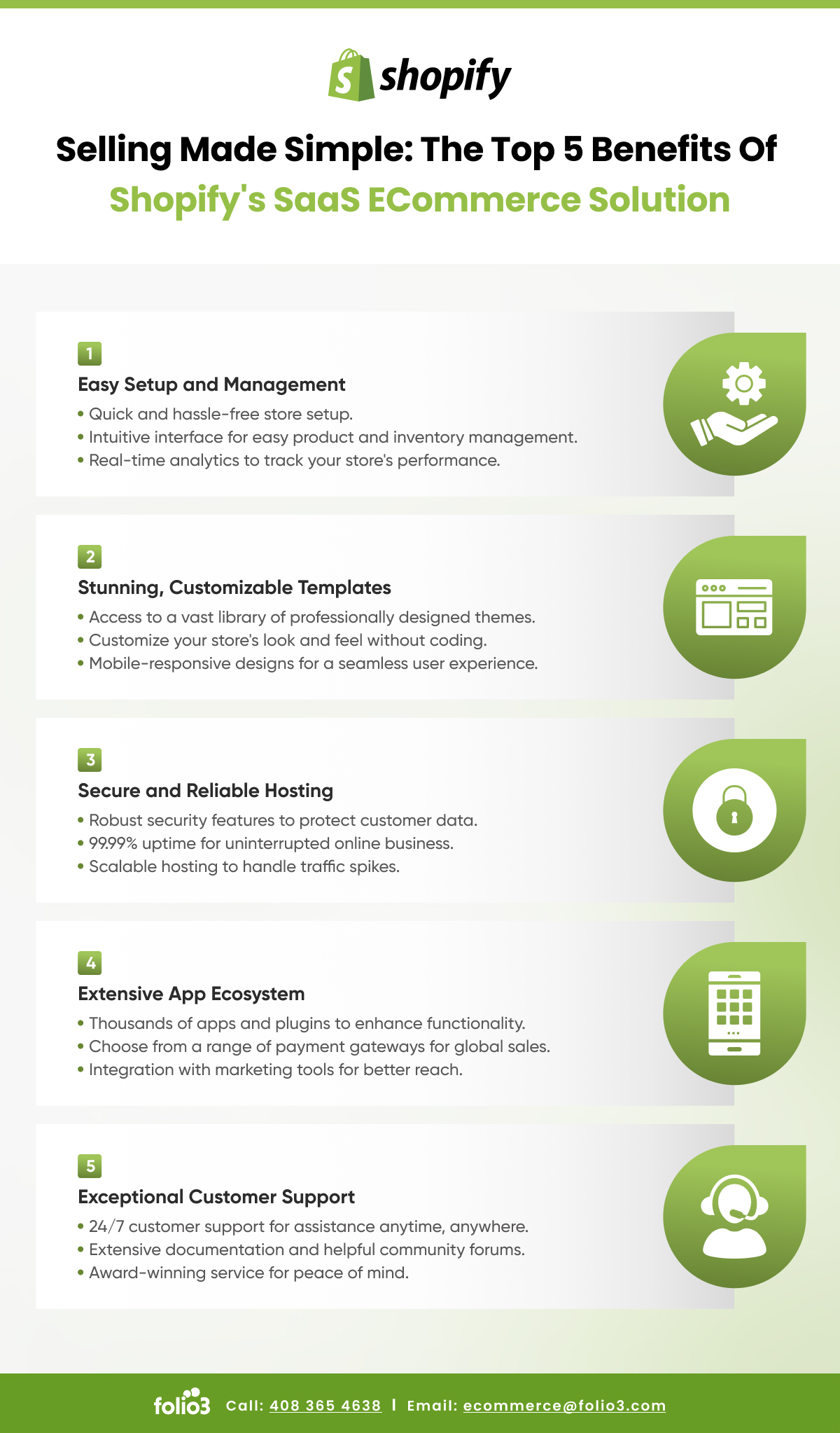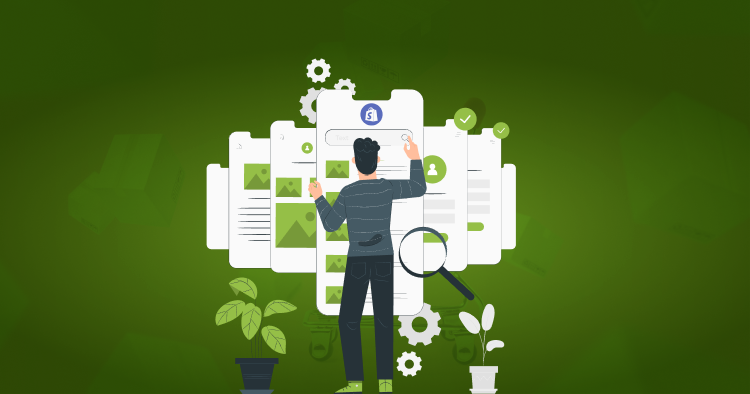An Overview: SAAS-Based eCommerce Platforms
Shopify has become popular for user-friendly websites that offer a convenient user experience, including efficiency. Shopify is helping thousands of businesses to offer a great online shopping experience.
In addition, it has a quick order fulfillment policy, which has resulted in stock growth. It wouldn’t be wrong to say that Shopify is a game-changer, and it’s changing the game for small-scale businesses too.
- Shopify is supporting over one million eCommerce stores in over 175 countries, according to Fundera.
- According to Fundera, Shopify has over 25.8 million third-party apps to help extend the store’s functionality.
The features of Shopify allow small brands to sell at a global scale with minimal investment and technical knowledge. For this reason, Shopify has become the third-biggest online retailer.
Still, with multiple SaaS-based eCommerce platforms, many brands wonder why Shopify is the right choice. So, let’s check out the benefits of a SaaS-based eCommerce platform!
What Is Shopify Plus?
Shopify is a SaaS-based eCommerce platform that has gained popularity in online retail. It’s a platform with multiple products that support eCommerce functions and online sales transactions. Small businesses with a limited budget can gain an edge in the industry. In addition, Shopify apps development and features are scalable, so businesses can keep using them, irrespective of how much they grow.
Shopify EDI Integration: The Ultimate Solution for Scaling Your Business
| What is EDI? | Electronic Data Interchange (EDI) is a standardized method for exchanging business documents electronically. |
| Shopify Integration | Shopify EDI integration involves connecting your Shopify store with EDI systems for seamless data exchange. |
| Benefits | – Efficiency: Automates data entry and reduces errors. |
| – Scalability: Easily handle large order volumes. | |
| – Accuracy: Ensures accurate order processing and inventory management. | |
| – Cost Savings: Minimizes manual labor and paper-based processes. | |
| – Faster Order Fulfillment: Speeds up order processing and shipping. | |
| Integration Methods | – Third-Party Apps: Use Shopify apps for EDI integration. |
| – Custom Development: Develop a tailored integration solution. | |
| EDI Documents | Common EDI documents for Shopify include purchase orders, invoices, and shipping notices. |
| EDI Standards | Common standards are EDIFACT, ANSI X12, and XML. |
| Automation | – Order processing, inventory updates, and order status notifications can be automated. |
| Trading Partners | Connect with suppliers, distributors, and retailers using EDI. |
| Compliance | Ensure compliance with industry-specific EDI requirements (e.g., retail, automotive). |
| EDI Service Providers | Consider EDI service providers for managed EDI services. |
| Costs | Costs vary based on integration complexity, transaction volume, and chosen solution. |
| ROI | Achieve ROI through reduced errors, increased efficiency, and improved customer satisfaction. |
| Challenges | Potential challenges include integration complexity and data mapping issues. |
| Security | Ensure data security with secure EDI connections and encryption. |
| Scalability | Shopify EDI integration can scale as your business grows. |
| Customer Experience | Enhance customer satisfaction with faster order processing and accurate shipments. |
Shopify EDI integration can significantly streamline your business operations and position you for growth in the e-commerce space. It’s essential to choose the right integration method and partners to maximize its benefits.
How Is Shopify Helping Small-Scale Businesses?
The analysis of the SaaS-based eCommerce platform shows that Shopify eases the process of hosting websites and eCommerce stores, irrespective of the devices. In addition, it offers tools and apps for businesses to sell customized products and expand their market reach. So, let’s see how Shopify is helping!
Read Also eCommerce Software as a Service
1. Ease Of Use
Shopify SaaS ECommerce Platform is easy to use for small businesses. Shopify is designed to be user-friendly and intuitive, with a simple and easy-to-navigate interface. This makes it easy for small business owners to set up and organize their online store’s products without needing extensive technical skills.
- It provides a range of features that can help small businesses get started quickly, including customizable themes and templates, built-in payment processing, multiple payment gateways such as affirm, Paypal, Shopify Pay and marketing tools.
- The platform also has a range of integrations with third-party tools and services, allowing small businesses to add functionality and features as they grow. Shopify also provides excellent customer support, with a 24/7 support team available to help small business owners with any issues or questions they may have.
- Additionally, Shopify has a large community of users and experts who provide resources and support, including forums, blogs, and educational materials.
- It is a great option for small businesses looking to launch and manage an online store. Its user-friendly interface, customizable features, and excellent customer support make it an ideal choice for small business owners who may not have extensive technical skills or resources. For instance, there are drag-and-drop features, which make it convenient to set up the store.
- The open-source framework of Shopify makes it customizable, and one can get business data, such as pending payments, sales, and sync inventory, through the homepage. In addition, the homepage provides suggestions about customer retention, SEO, and marketing.
2. Customer Targeting & Segmentation
Shopify is one of the most customer-centric SaaS-based eCommerce platforms out there. It allows you to create detailed customer profiles that include customer information, purchase history, and order details. This information can be used to segment your customers based on demographics, purchase behavior, and more
- There are email marketing campaigns and social media advertising that can be used to target specific customer segments with personalized messages.
- Also, the brands can create a customized checkout experience that can be tailored to different customer segments. For example, you can offer discounts or special promotions to specific customer groups.
- The brands can use ERP integrations to gain information about different customer segments through loyalty programs and consumer surveys.
- Further, the brands can access detailed analytics and reporting on customer behavior and sales, allowing you to track and analyze customer data to identify trends and opportunities for segmentation.
3. Seamless Product Management
Unlike other SaaS-based eCommerce platforms, Shopify has a variety of features and tools that allow businesses to manage products.
- First, Shopify allows businesses to create and manage a product catalog, including product descriptions, pricing, images, and other details.
- The platform also provides tools for organizing and categorizing products, making it easy for customers to find what they’re looking for.
- The availability of an inventory management app feature allows the brands to track stock levels, set up alerts for low inventory, and manage backorders. This helps businesses ensure they always have the right amount of stock available to meet customer demand.
- Creating product variants and managing them through one listing is possible. Lastly, the brands can also create gift cards, which improves the brand image.
4. Marketing & Advertising
Shopify has built-in SEO features that allow businesses to optimize their store for search engines. This includes customizable title tags and meta descriptions, automatic sitemap generation, and the ability to edit URLs for each page. In addition, email marketing features enable businesses to send customers promotional emails, newsletters, and abandoned cart reminders.
- With email marketing automation such as with Mailchimp, businesses can send targeted messages based on customer behavior, such as purchase history and browsing habits.
- Not to forget, Shopify makes it easy to connect with customers on social media platforms like Facebook, Instagram, and Pinterest.
- Businesses can use Shopify’s social media integrations to promote their products, run ads, and drive traffic to their store.
5. Advanced Tech Adoption
In the past few years, Shopify has accepted and integrated 3D and AR technology compared to other SaaS-based eCommerce platforms that have failed to evolve.
- Shopify has introduced 3D product visualization capabilities, allowing businesses to create 3D models of their products that customers can rotate and zoom in on. This gives customers a more detailed and realistic view of the product, helping them make more informed purchasing decisions.
- In addition, Shopify has also adopted augmented reality (AR) technology, which allows customers to place products virtually in their own environment. This gives customers a better idea of how a product will look and fit in their home or workspace before purchasing.
6. Fulfillment Centers
Shopify has a huge Fulfillment Network, unlike other SaaS-based eCommerce platforms. The businesses can access order fulfillment and distribution centers. In particular, fulfillment centers are a network of facilities that help businesses store, package, and ship their products to customers.
- Shopify offers this service as part of its platform, allowing businesses to outsource their fulfillment needs to a trusted third-party provider.
- The fulfillment centers are located in multiple regions, allowing businesses to store their products closer to their customers. This helps to reduce shipping costs and delivery times, improving the overall customer experience.
Hire Folio3 Shopify Theme Customization Solution to Enhance Business your Performance
The Bottom Line – Shopify SaaS Platform
It can be troublesome to go through different SaaS-based eCommerce platforms (it’s also monetarily draining for small businesses). However, Shopify offers customers an intuitive, user-friendly, and efficient shopping experience. In addition, small-scale businesses offer tools that help with store customization and support businesses with digitalization.
Hire Folio3 Shopify Web Development Company to consult more.
FAQs – Shopify SaaS Platform
Why Is Shopify Recommended For Small Businesses?
Shopify has customization, sales, and marketing features that help small businesses grow. In addition, there is a dedicated help and support team for the businesses. Most important, it is affordable.
Why do Companies Prefer Shopify and Not Any Other Platform?
Shopify is always preferred over other platforms. The main reason is that it has more than 50 pre-built themes that can be installed with a single click. After the theme installation, the user can add and organize products, images and other information without any hassle.
Hire Shopify Integration Services to Improve Business outcomes
Do Small Businesses Really Use Shopify?
Yes, small businesses use Shopify because the site builder and free tools allow businesses to sell online and through physical retail stores.
Hire Folio3 Shopify Expert Team to Know More
Do Businesses Get Successful By Hiring a Shopify Developer?
Yes, around 81% of sellers on Shopify start earning huge profits after two years, according to Yieldify.




